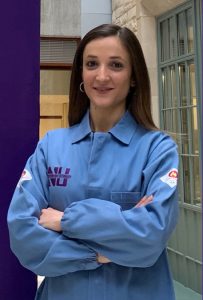Nanotechnology at Northwestern
Meet Francesca Arcudi, a postdoctoral fellow in the Weiss Lab
January 04, 2021
Francesca Arcudi is a postdoctoral fellow in the Weiss Lab, which studies the interaction of light with nanostructures for applications in catalysis, electronics, and biological sensing.
 Where are you originally from?
Where are you originally from?
I am from Italy. My hometown is Palermo, the capital of Sicily.
Where did you complete your undergraduate degree?
I completed my undergraduate degree at the University of Palermo, and then I moved to the University of Trieste, where I earned a PhD in Chemistry.
When did you first become interested in chemistry, and how did that lead you to your current work on carbon nanodots and quantum dots?
I particularly enjoyed my high school chemistry class. I became interested in chemistry during a high school university program because I experienced what it’s really like to be in a chemistry laboratory. I started my undergraduate with a particular interest in organic chemistry, but then I gradually became more fascinated by materials and nanotechnology. My main interests as a PhD student were synthetic approaches to designing carbon nanodots and how to access customized properties from the molecular to the nanoscale level.
When I joined the Weiss group, I was curious about how the surface chemistry influences the electronic structure of nanomaterials and how their design works towards real functions. I am passionate about both biological and energy-related fields. Quantum dots have attractive optical and electronic properties and are an ideal model system for this research.
How do you explain what you study to non-scientists?
I use chemistry to control and improve the properties of materials towards targeted applications. These materials are very small, one-billionth of a meter in size. My current project targets energy-related applications, in an area of research that aims at mimicking artificial photosynthesis. I study how materials can be activated by light to convert greenhouse gases — which contribute to global warming (such as carbon dioxide) — into fuels.
What are you most excited about in your current research?
I am a chemist by training and the potential of the chemical toolbox towards “materials by design” is what has always excited me. Quantum dots are excellent photosensitizers. The most exciting aspect of my current research is that the tuning of their surface chemistry can improve their photocatalytic properties for the conversion of carbon dioxide into fuels.
What has been a highlight of your time at Northwestern?
Engaging with extraordinary people, either lab mates or collaborators or staff, enjoying an exciting environment, and sharing this incredible experience with my significant other.
What has been the most challenging aspect of your work or your time at Northwestern?
The last year has been the most challenging for multiple reasons. The pandemic has forced us to adapt to a “new normal” that it is not easy to handle. NU is doing a good job in supporting research and researchers. I struggled the most with not being able to visit my family and friends.
Can you tell me about your experiences either being mentored or mentoring others?
I have been mentored in a way that balanced supervision and independence by mentors willing to share their enthusiasm for science and that’s how I want to be with my mentees.
My two mentors during the undergraduate studies, Prof. Renato Noto and Prof. Serena Riela, encouraged me to do research and find a topic I was passionate about. Prof. Maurizio Prato, my PhD supervisor, taught me how to be professional and helped me determine who I want to be as a scientist and how to do it. We maintain a strong link; he became a mentor for life and I always look for and value his advice. I am also grateful to Prof. Giacinto Scoles, Prof. Luisa De Cola and Prof. Marcella Bonchio, who helped shape my scientific character.
As a postdoc at Northwestern, Prof. Emily Weiss is helping me became an independent scientist. She is a great role model; her door (of the office before the pandemic, now Zoom room) is always open, and one can just marvel at emails answered in minutes or drafts revised in a couple of days. She fosters an incredibly enjoyable intellectual and training environment that I would love to recreate when I establish my own lab.
What are your hobbies outside of the lab?
I like cooking, traveling, learning about new cultures, and trying new foods. Whenever I return to my hometown, my favorite thing to do is to spend time with my six nieces and nephews.